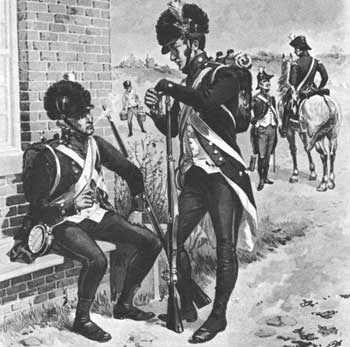





Historical Background
The War of 1812: Military Stalemate and National Awakening (continued)
THE HOME FRONT—DIVISION AND THE THREAT OF DISUNION
In 1807, after the Chesapeake-Leopard affair, the people of the United States had been psychologically ready for war with Great Britain. In 1812 they were not. By then, British interference with U.S. shipping was an old story, and the Nation entered the war badly divided. Commercial shipping interests, particularly in New England and New York City, saw ruin in a war that would bring the wrath of the British Navy down upon them. In westward expansion and the possible acquisition of Canada, New Englanders could see an increase in the political power of Southern and Western agricultural interests. The privateers brought some profit to shipping, but the British blockade after 1813 was effective. In 1814 U.S. exports dropped to 90 percent below those of 1807. To finance the war, Congress doubled the tariff and enacted an excise tax, a stamp tax, and a direct tax on the States. The tax load fell heaviest on New England, possessor of much of the Nation's liquid capital.
 |
| Authorized infantry uniforms and equipment during the period 1802-10. Enlisted men in foreground and officers in background. Artillerymen wore similar uniforms. From a lithograph by G. H. Buek and Company, after H. A. Ogden. Courtesy, Library of Congress. |
Loyalty in the Northeast reached its nadir in the Hartford Convention of December 1814 and January 1815. Despite the extreme sentiments of some of the delegates, most of them followed a reasonable course. The moderates, led by George Cabot and Harrison Gray Otis, were able to resist a radical movement for secession from the United States. The convention's final report blamed the Democratic-Republicans for the evils of the time. It also asked for constitutional amendments prohibiting embargoes of more than 60 days, limiting the President to one term, and prohibiting the election of two successive Presidents from the same State. When the convention dissolved, it pledged to take its grievances to Washington. But New England's grievances disappeared amid the news that the war was over and that Jackson had won a resounding victory at the Battle of New Orleans.
 |
 |
http://www.cr.nps.gov/history/online_books/founders-frontiersmen/intro11.htm
Last Updated: 29-Aug-2005